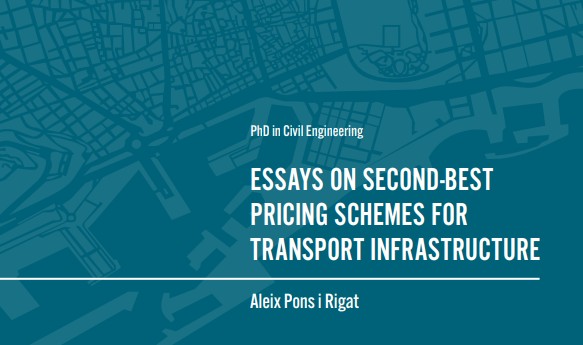
Dr. Aleix Pons has successfully defended his thesis on Second-best pricing schemes for Transport Infrastructure
Dr. Pons worked on the CENIT transport economics and policy research team from 2014 to 2018 before moving to London to continue his career. During his time at CENIT, and under the guidance of CENIT thesis advisors Dr. Sergi Saurí Marchán and Dr. Mateu Turró Calvet, Dr. Pons focused his research on examining certain critical second-best issues for the definition of transport pricing schemes through three different case studies.
Dr. Pons explains “The issue is that pricing has been pushed as a suitable policy instrument to deal with transport externalities for many years. And we also have seen that recent technological developments enable the implementation of more sophisticated pricing schemes at affordable transaction costs. However, the policy maker´s job is not an easy one. They face numerous constraints and conflicting policy objectives when putting transport pricing schemes into practice. This is where the second-best analysis of specific case studies comes into play – and contributes to translating insights from pricing theory into practical advice in policy design and evaluation.”
The thesis studies this second-best issue in the context of
– The application of workplace parking policies for Barcelona
The effects of policies addressing current inefficiencies around employer-paid parking on the urban economy are studied through a stylised microeconomic model and a numerical illustration for the metropolitan area of Barcelona.
– Environmental rail access charges in Europe
Current noise and pollution rail charges implemented in Europe are analysed qualitatively as to what extent they address second-best best issues of the rail market, including potential modal shifts to road transport and its imperfectly competitive environment.
– A road pricing reform in Catalonia
The proposed model and implementation path builds on a study of revenues and costs for the interurban network, and a qualitative analysis of the trade-offs between financial sustainability, mobility management, and spatial equity.
Please join us in congratulating Dr. Pons on his outstanding achievement and contribution to transport economics and policy.










